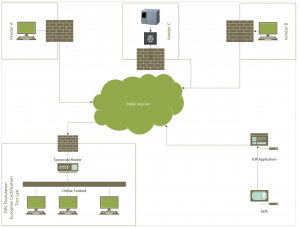Event Details
OPC Interoperability Workshop, Japan
Date:
Location:
Virtual
Map and Directions
Overview
In 2021 OPC Foundation Japan is organizing a virtual IOP Workshop (Online), which will connect OPC enabled products from all around the world to ensure global interoperability and Plug & Play solutions.
This workshop takes place June 16th – 18th 2021 and is intended for experienced IOP Workshop attendees. Because of the lack of in-person interactions and on-site help during this IOP Workshop, attendees are expected to have attended at least one IOP Workshop in the past.
Vendors can test and debug their products against one another for interoperability, robustness, and reliability.
Plan on debugging issues that occur and be prepared to modify your software components if required. Testing will be primarily for the successful operation between clients and servers; we will test for failures as time permits.
The 2019 IOPs were very successful, with several members reporting that it was “extremely valuable” in preparing their products for release.
The virtual IOP Workshop is open to corporate members of the OPC Foundation. Registration starts on May 1st and closes on June 1st. The space is limited to 30 server products, so check back and register in time!
Details
Available OPC Technology For Testing
- OPC UA Client/Server
- OPC UA PubSub (Unicast)
- Global Discovery Services
Provided Infrastructure For Testing
- Software packages to access the virtualized testing network
- Global Discovery Server for Certificate and Endpoint management
- Web-based application providing Test suggestions and for recording test results
- Opportunity for attendees to organize testing slots
- Communication platform for fast interactions
What to prepare
- OPC product(s) for testing
- Access to the virtualized testing network
- Reserve timeslots for 1:1 testing during the IOP Workshop
Agenda
Interoperability Workshop Preparations
Attendees will be asked to specify their products in the OPC Interoperability Test Application in order to have more time for testing during the workshop. Instructions will be provided in the event conformation email.
We will enable the VPN connections in the week before the IOP Workshop. During this week we highly recommend everybody to establish the connection and verify everything is operational. If needed, we will be provided support and guidance during this week to fix / address potential issues
Wednesday, June 16th
9:00 – 17:00 JST
- Introduction of regional and global contact persons
- Introduction of new IOP System
- Network and Computer Setup
- Verify Connectivity
- General Testing
Thursday, June 17th
09:00 – 17:00 JST
- General Testing
Friday, June 18th
09:00 – 17:00 JST
- General Testing
- Wrap-up and disconnection of clients/servers
Please note the following, as this IOP is operated by OPC Foundation Japan:
- All sessions with conversation will be held in Japanese mainly. However, the language for communication such as posting in chats is open to the attendees.
- The core time is 9:00 – 17:00 (JST)
- The IOP system itself runs 24 hours/day. Participants can conduct tests outside core time if they agree on the schedule with each other.
Introduction to the infrastructure and the test procedure:
- All Servers have to be specified by means of a web-based entry form (general properties, supported optional interfaces, supported ItemIDs/Conditions, etc.). This test data will be available for the clients.
- Clients will also use web-based entry forms to find available servers, view their properties, select them for testing, fill in test results, etc..
General Testing:
The remaining time will be available for general testing. Every client is expected to perform an IOP test with all available servers of other vendors. Web-based forms will show the status with respect to available servers and clients.
Each client vendor must enter the test results for each tested server into a web-based database. The database will be available to all participants at the end of the workshop.
Some of us will be available to help resolve general problems (Certification trust, network, specification ambiguities)




